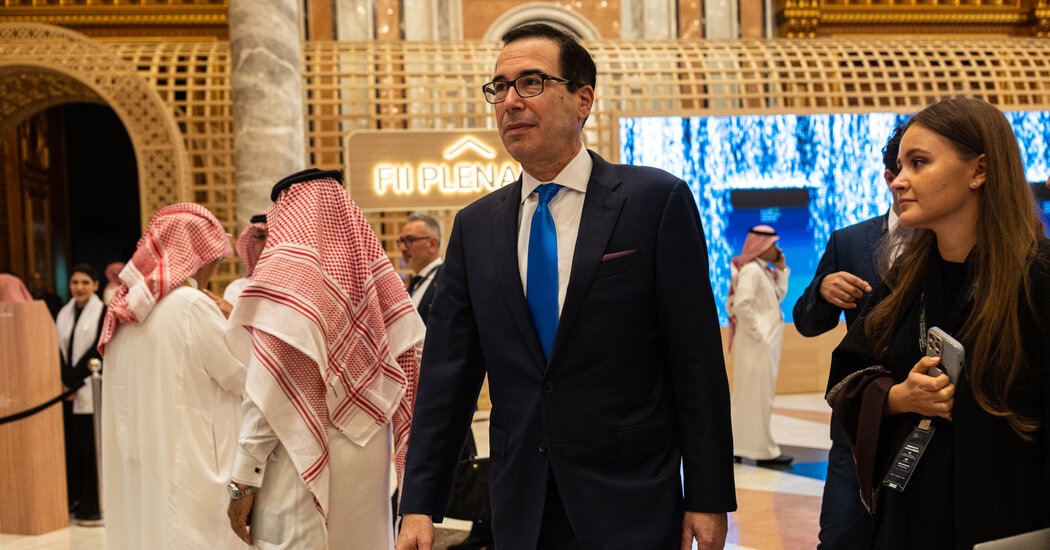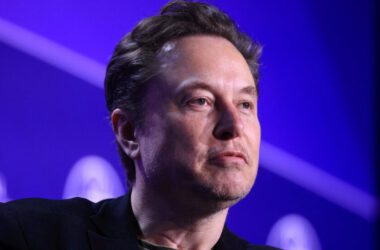What’s next for ByteDance’s U.S. investors?
As Beijing makes it increasingly clear that it opposes efforts by Congress to force TikTok’s Chinese parent company, ByteDance, to sell the popular video app — government officials in China said American lawmakers were acting like a “bandit” — the tech giant’s U.S. backers are increasingly finding themselves in a quandary.
DealBook has spoken with people in the know about what these investors, including financial giants like the Susquehanna International Group, can do, with billions of dollars on the line.
A potential takeover bid by Steven Mnuchin is adding a wrinkle to matters. Mnuchin, a former Treasury secretary, told Andrew on CNBC on Thursday that he was in talks with a “combination of U.S. investors” about a TikTok deal. He added that he had spoken with some of the investors in ByteDance, TikTok’s Chinese parent, about possibly rolling over their stake. He didn’t name names, but implied that one of them was General Atlantic’s Bill Ford.
Meanwhile, Bobby Kotick, the former C.E.O. of the video game giant Activision Blizzard, also reportedly has been looking for potential partners for a bid.
ByteDance investors’ phones are ringing off the hook, DealBook hears, as shareholders and potential advisers circle. They’re gaming out all manner of scenarios, including the worst case — a TikTok ban — or a workaround transaction that could satisfy Washington and Beijing.
One option is said to be removing ByteDance’s control over how TikTok operates, while allowing it to maintain its stake, The Financial Times reported. (Shari Redstone’s National Amusement stake in Paramount Global is based on a similar arrangement.) But such a radical restructuring would almost certainly need Chinese government approval.
Mnuchin needs deep-pocketed investors. ByteDance is estimated to be worth $225 billion, with the F.T. reporting on Friday, citing unidentified sources, that it collected $120 billion in revenue last year. (For comparison, Meta earned $135 billion.) While the value of the U.S. arm is unclear, the F.T. reports that the entity collected $16 billion in 2023.
The odds are long. “I don’t think there’s any way in the world China’s selling this asset and algorithm and everything in its entirety to Steve Mnuchin, Bobby Kotick or anyone in the U.S.,” Rich Greenfield, an analyst at LightShed Partners, told DealBook.
What happened to Grindr may serve as an example of what could happen. In 2020, the L.G.B.T.Q. dating app broke from its Chinese parent, after Washington demanded its divestiture. It has since gone public. Following a torrid rally, its market capitalization is around $1.7 billion.
George Arison, who became Grindr’s C.E.O. in 2022, told DealBook that the split was good for business. “We were able to then do things in a really positive way for privacy and message to our users that ‘Hey, privacy is number one,’” he said.
HERE’S WHAT’S HAPPENING
Nippon Steel commits to its U.S. Steel takeover despite President Biden’s opposition. The Japanese steel maker defended its $14 billion deal — and repeated a pledge not to close plants or cut jobs — after Biden said it was important to keep an American industrial icon in U.S. hands. In other M.&A. and national security news, the Emirati-backed investment firm RedBird IMI is reportedly leaning toward selling the Telegraph Media Group after the British government moved to block foreign ownership of British news media.
China plans to tighten I.P.O. requirements. The China Securities Regulatory Commission said on Friday that it would re-evaluate standards for companies seeking to list on the company’s stock markets, and more closely examine businesses that hadn’t yet become profitable. It’s the latest effort by Beijing to shore up confidence in the country’s capital markets.
Ira Millstein, a longtime advocate for corporate governance changes, dies at 97. Over his decades-long career, Millstein pushed for company boards to exercise more independent oversight, keeping corporate leaders in check. He also played important roles outside of business, including advising New York City during its fiscal crisis and helping Ruth Bader Ginsburg’s nomination to the federal bench.
Goldman’s chief sees progress
In 2023, Goldman Sachs took big steps to fix itself, including by selling off the bulk of its consumer businesses to refocus on its Wall Street operations.
That effort has recharged the stock price, giving the bank’s C.E.O., David Solomon, cause to celebrate in his latest letter to shareholders, out on Friday.
“We put the firm in a stronger position for 2024 and beyond, as we continued to execute on our growth strategy,” Solomon writes. That has meant selling off noncore operations like the GreenSky consumer lending division, as well as putting more emphasis on its wealth-management business. Goldman’s profit slumped last year, but Solomon notes the firm has raised more than $250 billion in alternative assets under management, beating its $225 billion target a year early.
“I am now hearing consistently that our strategy has never been clearer, and I’m proud to say that’s a direct result of everything we achieved in 2023,” he writes. (The firm’s board has already commended Solomon, giving him $31 million in compensation, a 24 percent raise.)
Solomon hailed his five-year track record as Goldman’s C.E.O. The firm’s stock price is up 130 percent, he notes, while its book value per share has risen 50 percent.
That said, Goldman shares currently trade at about 1.27 times its book value, while Morgan Stanley’s trade at 1.6 times and JPMorgan Chase’s at 1.7 times.
There are broader reasons for optimism, according to Solomon. “The U.S. economy has proven more resilient than expected, and markets are predicting rate cuts,” he writes. That is helping improve the outlook for Goldman’s core investment banking businesses, including advising on deals and I.P.O.s.
Still, he cautioned, “I think inflation may prove stickier than many anticipate.”
The I.R.A. spurs a green investing boom
The Biden administration’s signature climate and infrastructure laws have redrawn the lines around greentech investing, with European and Asian clean-energy companies racing across the ocean to tap generous U.S. grants and tax breaks.
Among the companies is Climeworks, a Swiss carbon-capture specialist that just announced plans to open a new U.S. base in Austin. Its westward push comes as American trade partners complain that the laws are distorting the clean-energy market and as U.S. deficit hawks worry about the rising costs of the climate-focused initiatives.
Climeworks is betting on big carbon-capture subsidies. Biden’s climate laws allocate about $3.5 billion in tax breaks and grants to help companies build direct air-capture facilities, a technology that often uses giant fans to suck carbon dioxide out of the sky.
The start-up is one of the sector’s best-financed, raising $810 million from sources including Microsoft, the Singaporean sovereign wealth fund G.I.C. and the venture capitalist John Doerr.
Douglas Chan, general manager of Climeworks’s U.S. operations, told DealBook that the company was finalizing negotiations with the Energy Department for a big piece of a $600 million grant to build D.A.C. facilities in Louisiana, California and North Dakota. He also said he expected to triple the company’s U.S. head count to manage the project’s workload.
The laws’ generous giveaways “were enough that we decided to come to America,” Chan said.
It’s the latest sign of international companies’ eagerness to tap the Biden climate money. “The United States has become an epicenter for green investment because of the Inflation Reduction Act,” Artem Abramov, an analyst for Rystad Energy, an independent research and advisory firm, told DealBook.
Rystad forecasts that investments in U.S. green-energy projects will reach approximately $100 billion this year, nearly doubling since 2019.
Other countries are betting big on green, too. Moscow’s full-scale invasion of Ukraine has also catalyzed investment in clean energy and emissions-reduction, Abramov noted, as Europe seeks to pivot from Russian fossil fuels. That money is flowing into solar, wind, hydrogen and carbon-capture projects in Europe — as is the case in the U.S.
Watch the impact of financing costs, though. High interest rates have delayed some projects, Abramov said. But he added, “the outlook for green energy projects looks strong.”
Taiwan wants satellite sovereignty
Through Starlink and SpaceX, Elon Musk’s lock on the satellite-internet sector has begun to concern countries and his corporate rivals. Starlink owns half of the active satellites orbiting the Earth, and many competitors rely on his rocket company, SpaceX, to launch their payloads into orbit.
Taiwan wants no part of the Musk-controlled duo.
The island nation is investing billions to build a Starlink alternative. Its goal: to launch its first satellites into space by 2026, believing that’s the best way to ensure its communication infrastructure can withstand disruptions and cyberattacks from the likes of China, The Times reports.
Would relying on Starlink make Taiwan more vulnerable? Musk has acknowledged using his control of Starlink to thwart an attack in another volatile corner of the planet: Ukraine. Taiwan, which is under constant threat from China, sees that as instructive.
“The Ukraine-Russia war gave us a profound reflection,” Liao Jung-Huang, a director at the government-sponsored Industrial Technology Research Institute, told The Times. “Even if the cost to build it is high, in a special scenario, the value of having our own constellation is unlimited.”
Musk’s China ties loom large. Tesla, his electric vehicle company, is deeply reliant on the Chinese market as a growth engine, even as competition intensifies there. And Musk caused an uproar in Taiwan in September when he appeared to side with China in the decades-old dispute over the island nation’s sovereignty.
Questions are already swirling about Musk and Taiwan. Last month, the China hawk Representative Mike Gallagher, Republican of Wisconsin, sent a letter to SpaceX, Tesla and Elon Musk accusing them of withholding internet service in Taiwan, possibly violating contractual obligations with the U.S. government. SpaceX denied anything was amiss.
THE SPEED READ
Deals
Policy
Best of the rest
We’d like your feedback! Please email thoughts and suggestions to dealbook@nytimes.com.




